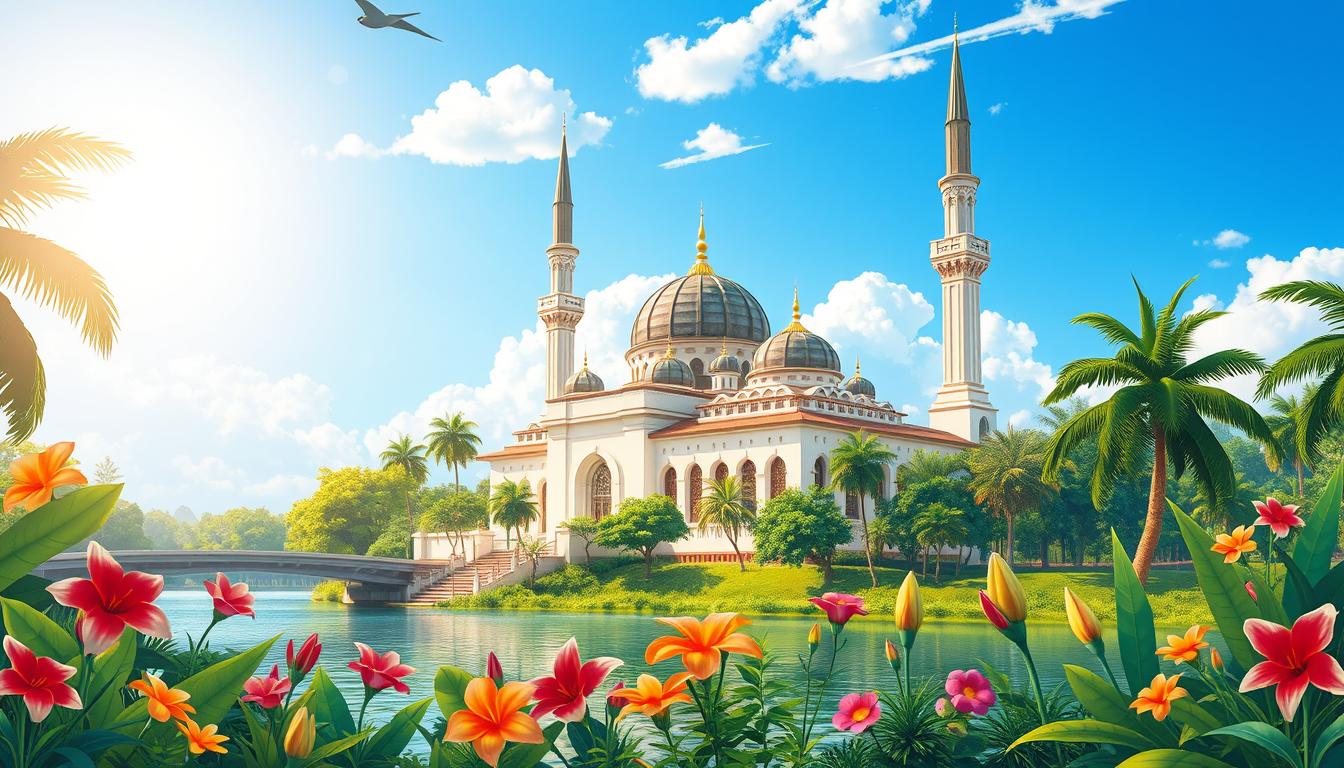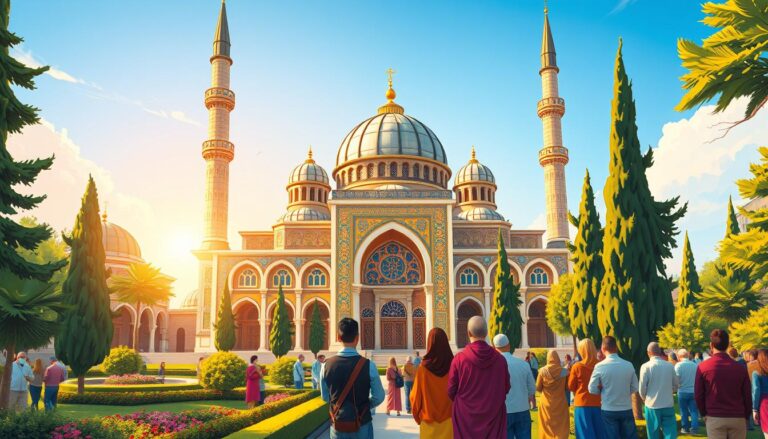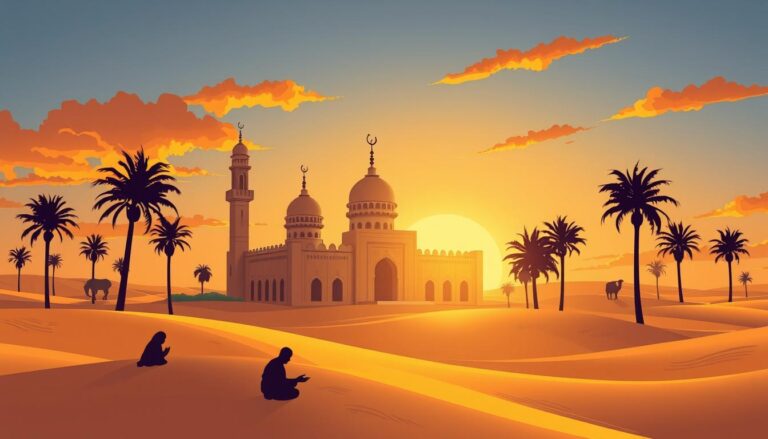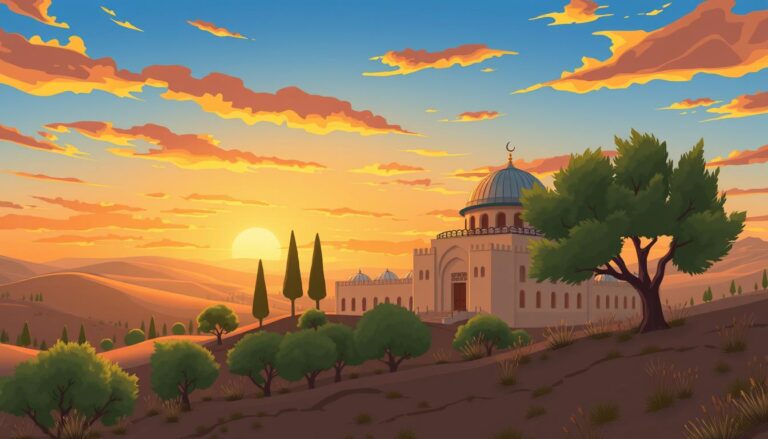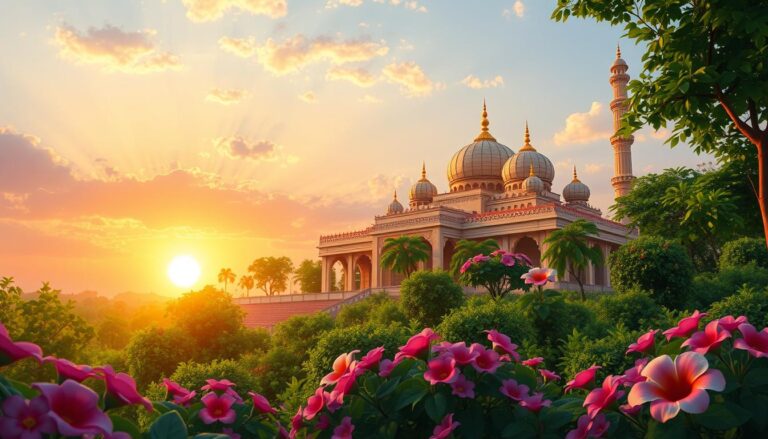Islam in Malaysia
Islam is the main religion in Malaysia, with over 63.5% of people following it as of 2020. The country’s constitution says Islam is the “religion of the Federation.” But, it also lets people practice other religions. Malaysia has a mix of religions, with Buddhists, Christians, and Hindus making up a significant part of the population.
Islam plays a big role in Malaysian society. It shapes the country’s culture, politics, and social life.
Malaysia has about 20.6 million Muslims, making it a big Islamic community. Islam’s influence is seen in many parts of Malaysian life. This includes Islamic holidays, architecture, and education.
Introduction to Islam in Malaysia
Islam has been a big part of Malaysia since the 12th century. It was brought by Arab Muslim and Tamil Indian traders. Over time, it became the main religion of the Malay people. Today, Islam is a key part of who Malaysians are and is the official religion.
Overview of Islam’s Presence in Malaysia
The spread of Islam was tied to the Indian Ocean trade routes. These routes connected China to India, the Middle East, and Africa from the 13th to the 17th centuries. Malacca, founded around 1400, was a major trading center, attracting merchants from all over.
In the 15th century, Islam began to mix with earlier beliefs of the Malay people. By the 19th century, many Malays were not strict Muslims.
Significance of Islam in Malaysian Society
Islam’s impact is seen in many parts of Malaysian life. It influences the celebration of Islamic holidays and the design of buildings. The religion also shapes the country’s culture and identity.
The Malaysian constitution makes Islam the official religion. This close tie between Islam in Malaysia and the Muslim population in Malaysia is a big part of the Islamic culture in Malaysia.
“Islam has been a significant part of Malaysian identity for centuries, shaping the country’s social, cultural, and political landscape.”
Historical Background of Islam in Malaysia
The story of Islam in Malaysia began in the early 7th century. Arab traders and Muslim missionaries first came to the Malay Archipelago. Over time, Islam spread across the region, becoming a major part of life by the 13th century.
The first Malay state, Melaka, officially became Muslim in the 13th century. This marked a big change in the area’s history.
Spread of Islam in the Malay Archipelago
The spread of Islam in the Malay Archipelago was slow but steady. Islamic history in Malaysia shows that Arab traders brought Islam to the coastlines. Sufi mystics and preachers also played a big role, using their teachings to win over the Malay Malay Muslim community.
Conversion of Malay Sultanates to Islam
The 13th century was a key time for Islam in Malaysia. Melaka, the first Malay state, became Muslim. This led to other Malay sultanates like Kedah and Terengganu following suit.
By the 15th and 16th centuries, Islam was the main religion among the Malay people. It has stayed that way ever since.
“The conversion of the Malay sultanates to Islam was a pivotal moment in the region’s history, shaping the cultural and religious landscape of Malaysia for centuries to come.”
The history of Islam in Malaysia shows a strong bond between the Malay Muslim community and the religion. This bond has grown over the years and is a key part of Malaysia’s culture today.
Islam as the Official Religion of Malaysia
Malaysia is a country in Southeast Asia where Islam is very important. It is officially recognized as the “religion of the Federation” in the constitution. This makes Islam a key part of the country’s laws and politics.
The government supports Islamic institutions and follows the Sunni form of Islam. This is especially the Shafi’i school of jurisprudence. This shows how deeply Islamic culture is rooted in Malaysia.
“Malaysia is a majority Muslim country with Islam being the official religion. The population of Malaysia is approximately 26 million, with about 55% Malay Muslims, totaling around 14 million.”
While Sharia law in Malaysia is key in the legal system, the constitution also allows other religions. These include Buddhism, Christianity, and Hinduism, making up about 40% of the population. This mix of religions presents both challenges and opportunities for unity.
The official status of Islam in Malaysia shows the nation’s long history with the religion. As Malaysia deals with its diverse religious society, the role of Sharia law in Malaysia and Islamic culture in Malaysia will be a big topic of discussion.
Demographic Distribution of Muslims in Malaysia
According to the 2020 census, Muslims are a big part of Malaysia’s population. About 63.5% of the country’s people, or 20.6 million, are Muslim. The Muslim population varies across Malaysia’s states.
Percentage of Muslim Population by State
In the northeastern states of Kelantan and Terengganu, most people are Muslim. Kelantan has 95.5% Muslims, and Terengganu has 97.3%. States like Sabah and Sarawak have fewer Muslims, with 69.6% and 34.2% respectively. Kuala Lumpur and Putrajaya also have large Muslim populations.
The Muslim population in Malaysia shows the country’s rich culture. Despite Islam being the main religion, Malaysia values religious freedom. This allows different faiths and traditions to thrive together.
“As of 2020, approximately 63.5% of Malaysia’s population adheres to Islam, making it the most widely practiced religion in the country.”
Islamic Practices and Traditions in Malaysia
Islam is a big part of Malaysia’s culture. Many Islamic holidays and festivals are a big part of their traditions. The country has about 33.9 million people, with 63.5% of them being Muslim.
Observance of Islamic Holidays and Festivals
Important Islamic events like Eid al-Fitr, Eid al-Adha, and Mawlid are celebrated as national holidays. These festivals bring the Muslim community together. They celebrate with feasting and spiritual reflection.
Islamic Architecture and Mosques
Islamic architecture is all over Malaysia, with many mosques showing the religion’s importance. The National Mosque of Malaysia in Kuala Lumpur is a great example of this.
“Malays in Malaysia believe in living harmoniously with nature and their surroundings to promote a healthy co-existence.”
Islamic practices and traditions are a big part of Malaysian life. This shows how deeply Islam influences the country’s culture and society.
Islamic Education and Institutions in Malaysia
Islamic education is very important in Malaysia. The government supports Islamic schools and programs a lot. This shows how important Islam is in the country.
The International Islamic University Malaysia (IIUM) is a key place for studying Islam. It was started in 1983. The IIUM wants to make learning relevant to Muslims.
The government also builds mosques and suraus. They help people go on pilgrimages to Mecca. These actions show the government’s dedication to Islamic education and traditions.
But, Islamic education in Malaysia has faced problems. Some schools, like Sekolah Agama Rakyat (SAR), were questioned for links to extremist groups. In 2003, the government moved many students and teachers to regular schools.
“In 2001, twenty-five members of the Malaysian Militant Group (KMM) were arrested, including nineteen graduates from the quasi-independent Sekolah Agama Rakyat (SAR).”
Even with these issues, the government still supports Islamic education. They give money to religious schools every year. For example, in 2011, they gave RM 35.6 million (AUD 10.8 million) to schools in Kelantan.
The importance of Islamic education in Malaysia shows the country’s strong religious ties. The government tries to keep Islamic values in education.
Islam in Malaysia
Malaysia is mostly Muslim, with most people following Shafi’i Sunni Islam. This school of thought is deeply rooted in the country. The government supports and enforces it.
Shafi’i Sunni Islam and Its Prevalence
Shafi’i Sunni Islam is the main form of Islam in Malaysia. Nearly all of the country’s Muslim population, over 60% of the total, follows this school. This is because of the historical spread of Shafi’i Islam in the Malay Archipelago and the government’s efforts.
Restrictions on Other Islamic Denominations
While Shafi’i Sunni Islam is the official and dominant form of Islam in Malaysia, the government has imposed strict restrictions on other Islamic denominations, such as Shia Islam. This policy is rooted in the country’s constitutional designation of Islam as the official religion and the government’s commitment to maintaining the Sunni-Shafi’i interpretation as the sole authoritative version of the faith.
- A 1996 fatwa mandates adherence to Sunni teachings of the Shafi’i school in Malaysia.
- Corporate punishment for apostasy in Pahang includes a fine, prison term, and up to six strokes of the cane.
- The maximum punishment for apostasy in Kelantan and Terengganu is death, although this penalty has never been imposed.
- Caning is permitted for various offenses including consensual same-sex relations, drug trafficking, and criminal breach of trust.
- The law prohibits non-Muslims from proselytizing Muslims, with penalties such as imprisonment and caning varying by state.
These restrictive policies have effectively marginalized other Islamic denominations in Malaysia. They have solidified the Shafi’i Sunni interpretation as the dominant and accepted form of the religion in the country.
Islam and Politics in Malaysia
The link between Islam and politics in Malaysia is complex. Islamic values guide the country’s major political parties. The ruling Barisan Nasional coalition and the opposition Pan-Malaysian Islamic Party (PAS) lead the way. PAS pushes for Islamic state laws, or hudud, in states like Kelantan.
The government uses mosques to spread political messages. This ties Islam closely to Malaysia’s politics.
Role of Islamic Parties and Islamic State Laws
Islamic parties, like PAS, shape Malaysia’s politics. PAS wants Islamic state laws, or hudud, in its states. But the federal government is hesitant, worried about constitutional issues.
The government claims to support Islamic values. It uses mosques to send political messages. This mix of Islam and politics defines Malaysia’s politics.
“The relationship between Islam and politics in Malaysia is complex and multifaceted, reflecting the country’s diverse religious landscape and the ongoing struggle to balance religious and political interests.”
Religious Tolerance and Harmony in Malaysia
Malaysia is known for its rich cultural mix and religious tolerance. Despite Islam being the main religion, the country’s constitution protects freedom of religion. This allows people of other faiths to practice openly.
However, some rules, like the ban on non-Muslims using the word “Allah,” have faced criticism. Yet, Malaysia has worked hard to improve understanding between different religions. It celebrates major holidays of all faiths as national days, showing respect and inclusivity.
A study with 17 experts from various fields found what makes Sabah religiously harmonious. They noted things like intermarriage and houses of worship close to each other. These factors help bring people together.
“Religious freedom has a profound impact on societal accommodation, as observed in a study on peaceful coexistence between Muslims and non-Muslims in Houston, Texas,” said a leading expert on interfaith relations.
In Malaysia, studies have shown how important daily interactions and family support are for religious harmony. But, the country also faces challenges like religious conflicts. These are often caused by differences and negative actions on social media.
Malaysia keeps working to balance its diverse religious landscape. The government, faith leaders, and civil groups aim to build a society that values religious tolerance in Malaysia and religious harmony in Malaysia.
Conclusion
Islam is a big part of Malaysia’s identity and has greatly influenced its history, culture, and politics. As the official religion, Islam in Malaysia affects many areas, like religious practices, architecture, and education. Despite Malaysia’s religious tolerance, debates and tensions arise over Islam’s role.
The Muslim population in Malaysia is growing, making it important to balance tradition with modern values. The Islamic culture in Malaysia is rich, with a history of Islamic practices and traditions. The Malay Muslim community has kept these traditions alive through Islamic education and Sharia law in Malaysia.
Malaysia’s journey will be shaped by the mix of religion, politics, and diversity. It’s key to keep religious tolerance and harmony while honoring Islamic history in Malaysia. This will help shape Malaysia’s future and its global standing.
Source Links
- Islam in Malaysia
- Religion in Malaysia
- Islam in Malaysia vs. Indonesia: Key Differences
- Kuala Lumpur: Islam in Malaysia | M.A.R. Habib
- Introduction
- Malaysia – Islam, Trade, Culture
- Islam in Malaysia: An Entwined History
- ISLAM IN MALAYSIA | Facts and Details
- Government and Religion in Malaysia
- Many Countries Favor Specific Religions, Officially or Unofficially
- Malaysia’s Sisters in Islam (SIS)
- 2023 USCIRF Annual Report
- The Demographics of Islam in Asia – Association for Asian Studies
- The Impact Of Islamization On The Malays In Malaysia
- Universalising Islam in Malaysia – New Mandala
- Malaysia – United States Department of State
- Islamic Education in Southeast Asia
- Islamic Education in Malaysia
- The ups and downs of Islamic education in Malaysia – New Mandala
- 2023 Report on International Religious Freedom: Malaysia
- Identifying Malaysia’s Identity: An Islamic or Secular State? | Taylor’s University
- The Role of Islam in Malaysian Political Practice
- Islamism In Malaysia: Politics As Usual?
- Political struggle of Malaysia and Islam: moderating and radicalizing the state, society, and religion alternately (1957–2023) – Discover Global Society
- The framework of socio-religious harmony in Sabah, East Malaysia: An application of Fuzzy Delphi method
- Malaysia – United States Department of State
- Malaysia: Muslim Leaders Call For Religious Tolerance
- 2022/96 “Islamisation in Malaysia Beyond UMNO and PAS” by Norshahril Saat and Afra Alatas
- The Impact of Islam on Malaysia Before Independence

